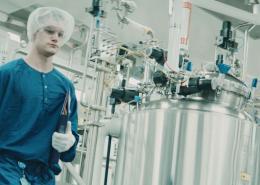Pfizer Announces Start of Phase 3 Clinical Trial in Adults for Its Investigational Vaccine Against Respiratory Syncytial Virus (RSV)
- First subjects vaccinated in study of Pfizer’s RSV bivalent prefusion F subunit investigational vaccine candidate in adults ages 60 or older
- RSV is a common and pervasive cause of severe acute respiratory illness in older adults with no vaccine currently available
NEW YORK--(BUSINESS WIRE)-- Pfizer Inc. (NYSE:PFE) today announced the initiation of RENOIR (RSV vaccine Efficacy study iNOlder adults Immunized against RSV disease), a Phase 3 clinical trial evaluating the efficacy, immunogenicity, and safety of a single dose of its respiratory syncytial virus (RSV) bivalent prefusion F subunit investigational vaccine candidate (RSVpreF) in adults ages 60 years or older.
“RSV is a significant cause of severe respiratory disease in older adults, and it can cause disability and death. There is an important unmet medical need for an effective vaccine that can help protect older adults against this highly-contagious disease,” said Kathrin U. Jansen, Ph.D., Senior Vice President and Head of Vaccine Research & Development at Pfizer Inc. “The start of this Phase 3 study is an important step forward towards our goal of comprehensive immunization against RSV disease, which includes developing a potential first vaccine to help prevent RSV disease in adults as well as the ongoing efforts to help protect infants through maternal immunization, subject to regulatory approval of the candidate vaccine.”
The Phase 3 RENOIR trial of RSVpreF is a global, randomized, double-blind, placebo-controlled study that expects to enroll approximately 30,000 participants 60 years and older. The primary objectives of the study will assess safety and efficacy for the prevention of moderate to severe lower respiratory tract illness (msLRTI-RSV) during the first RSV season.
RSV is a seasonal illness that commonly starts in the fall months, peaking in the winter when colds and other respiratory illnesses are more common.1
Burden of RSV
Respiratory syncytial virus (RSV) is a common and pervasive cause of acute respiratory illness.2,3 The virus is highly contagious and affects the lungs and airways. 4,5 Infections occur in people of all ages and can feel like the common cold for most young adults, but for infants, the immunocompromised, and older adults, it can be potentially life-threatening.3
The risk of serious infection increases in older adults and for those with chronic heart or lung disease or a weakened immune system.2 In the U.S., it is estimated that more than 177,000 older adults ≥65 years of age are hospitalized and 14,000 of them die each year due to RSV. 2,6 There is no vaccine to prevent RSV and the medical community is limited to offering only supportive care for those with the illness.
About RSVpreF
Pfizer’s investigational RSV vaccine candidate builds on foundational basic science discoveries including those made at the National Institutes of Health (NIH), which detailed the crystal structure of a key form of a viral protein that RSV uses to attack human cells. The NIH research showed that the antibodies that protect humans from RSV target this one form of the viral protein. Applying insights from this important work, Pfizer developed and tested numerous candidates and identified those that elicited a strong anti-viral immune response in pre-clinical evaluation, which led to the vaccine candidate that Pfizer is evaluating in human trials.
In July 2021, Pfizer provided an update on a Phase 2a study evaluating the safety, immunogenicity and efficacy of RSVpreF in a virus challenge model in healthy adults 18 to 50 years of age. The results of the study enabled Pfizer to proceed to Phase 3. Detailed results from the Phase 2a study will be shared in a future scientific forum.
In April 2020, positive top-line results were achieved for a Phase 2b proof-of-concept study of RSVpreF, which evaluated the safety, tolerability and immunogenicity of RSVpreF in vaccinated pregnant women ages 18 through 49 and their infants. Detailed results from the study will be shared at a future medical conference. In November 2018, the FDA granted Fast Track status to RSVpreF for prevention of RSV-associated lower respiratory tract illness in infants by active immunization of pregnant women.
About Pfizer: Breakthroughs That Change Patients’ Lives
At Pfizer, we apply science and our global resources to bring therapies to people that extend and significantly improve their lives. We strive to set the standard for quality, safety and value in the discovery, development and manufacture of health care products, including innovative medicines and vaccines. Every day, Pfizer colleagues work across developed and emerging markets to advance wellness, prevention, treatments and cures that challenge the most feared diseases of our time. Consistent with our responsibility as one of the world's premier innovative biopharmaceutical companies, we collaborate with health care providers, governments and local communities to support and expand access to reliable, affordable health care around the world. For more than 170 years, we have worked to make a difference for all who rely on us. We routinely post information that may be important to investors on our website at www.Pfizer.com. In addition, to learn more, please visit us on www.Pfizer.com and follow us on Twitter at @Pfizer and @Pfizer News, LinkedIn, YouTube and like us on Facebook at Facebook.com/Pfizer.
DISCLOSURE NOTICE:
The information contained in this release is as of September 2, 2021. Pfizer assumes no obligation to update forward‐looking statements contained in this release as the result of new information or future events or developments.
This release contains forward-looking information about Pfizer’s respiratory syncytial virus (RSV) bivalent prefusion F subunit vaccine (RSVpreF) candidate, including its potential benefits, that involves substantial risks and uncertainties that could cause actual results to differ materially from those expressed or implied by such statements. Risks and uncertainties include, among other things, the uncertainties inherent in research and development, including the ability to meet anticipated clinical endpoints, commencement and/or completion dates for our clinical trials, regulatory submission dates, regulatory approval dates and/or launch dates, as well as the possibility of unfavorable new clinical data and further analyses of existing clinical data; the risk that clinical trial data are subject to differing interpretations and assessments by regulatory authorities; whether regulatory authorities will be satisfied with the design of and results from our clinical studies; whether and when biologic license applications may be filed in any jurisdictions for RSVpreF for any potential indications; whether and when any such applications may be approved by regulatory authorities, which will depend on myriad factors, including making a determination as to whether the product's benefits outweigh its known risks and determination of the product's efficacy and, if approved, whether RSVpreF will be commercially successful; decisions by regulatory authorities impacting labeling, manufacturing processes, safety and/or other matters that could affect the availability or commercial potential of RSVpreF; uncertainties regarding the ability to obtain recommendations from vaccine advisory or technical committees and other public health authorities regarding RSVpreF and uncertainties regarding the commercial impact of any such recommendations; the impact of COVID-19 on our business, operations and financial results; and competitive developments.
A further description of risks and uncertainties can be found in Pfizer’s Annual Report on Form 10-K for the fiscal year ended December 31, 2020 and in its subsequent reports on Form 10-Q, including in the sections thereof captioned “Risk Factors” and “Forward-Looking Information and Factors That May Affect Future Results”, as well as in its subsequent reports on Form 8-K, all of which are filed with the U.S. Securities and Exchange Commission and available at www.sec.gov and www.pfizer.com.
1 Centers for Disease Control and Prevention. “Respiratory Syncytial Virus Infection (RSV)” – Trends & Surveillance. Accessed 27 August 2021. Availale at https://www.cdc.gov/rsv/research/us-surveillance.html.
2 Centers for Disease Control and Prevention. “Respiratory Syncytial Virus Infection (RSV) – Older Adults are at High Risk for Severe RSV Infection Fact Sheet.” Accessed 27 August 2021. Available at https://www.cdc.gov/rsv/factsheet-older-adults.pdf.
3 Centers for Disease Control and Prevention. “Respiratory Syncytial Virus Infection (RSV) – Symptoms and Care.” Accessed 27 August 2021. Available at https://www.cdc.gov/rsv/about/symptoms.html
4 Centers for Disease Control and Prevention. “Respiratory Syncytial Virus Infection (RSV) – RSV in Older Adults and Adults with Chronic Medical Conditions” Accessed 27 August 2021. Page last reviewed 18 December 2020. Available at https://www.cdc.gov/rsv/high-risk/older-adults.html.
5 Centers for Disease Control and Prevention. “Respiratory Syncytial Virus Infection (RSV) – RSV Transmission” Accessed 27 August 2021. Available at https://www.cdc.gov/rsv/about/transmission.html.
6 Falsey AR, Hennessey PA, Formica MA, Cox C, Walsh EE. Respiratory syncytial virus infection in elderly and high-risk adults. New Engl J Med. 2005;352(17):1749-59.
View source version on businesswire.com: https://www.businesswire.com/news/home/20210902005069/en/
Media Contact:
Steve Danehy
+1 (978) 273-3946
Steve.Danehy@pfizer.com
Investor Contact:
Bryan Dunn
+1 (212) 733-8917
Bryan.Dunn@pfizer.com
Source: Pfizer Inc.












